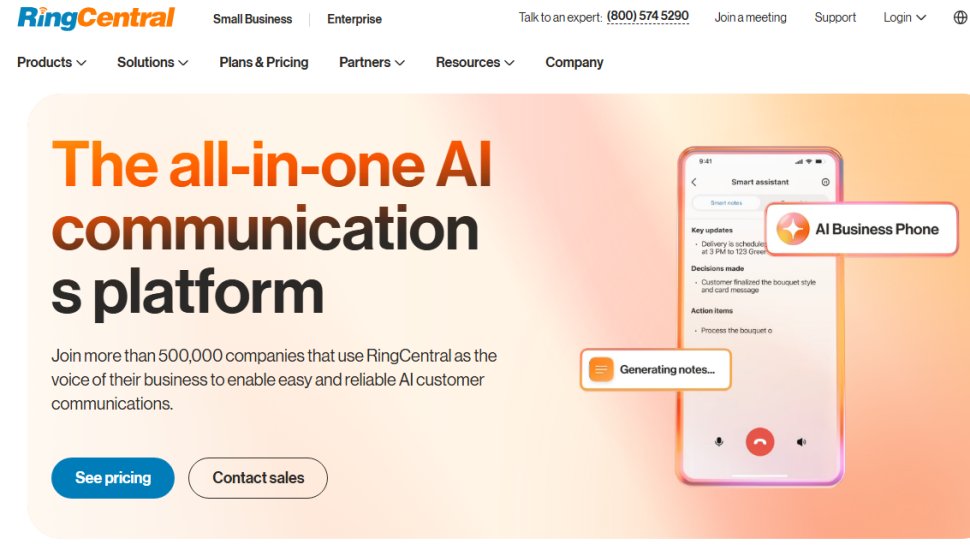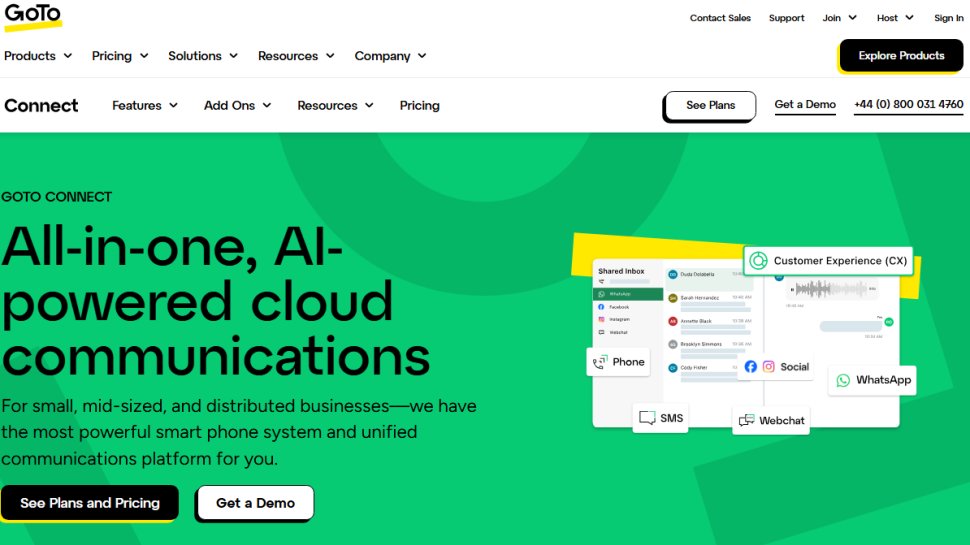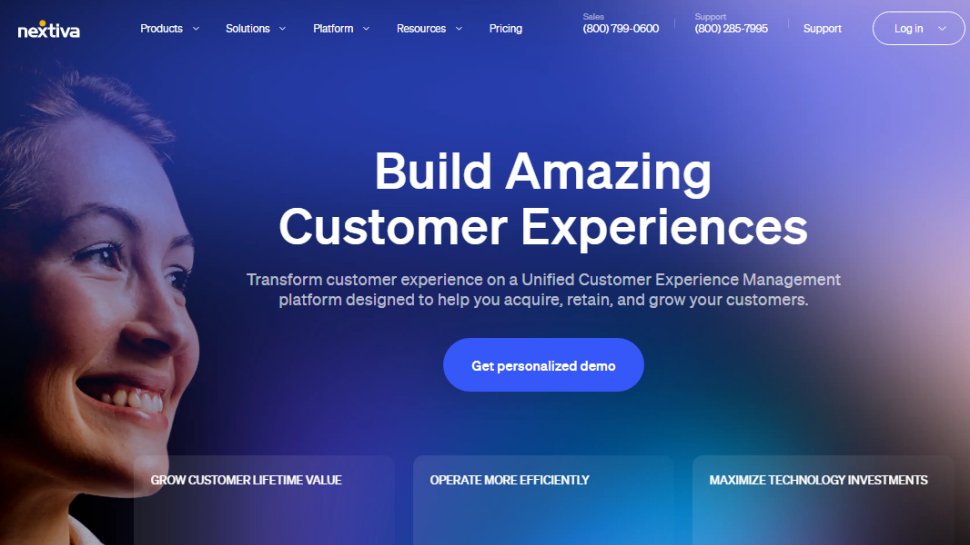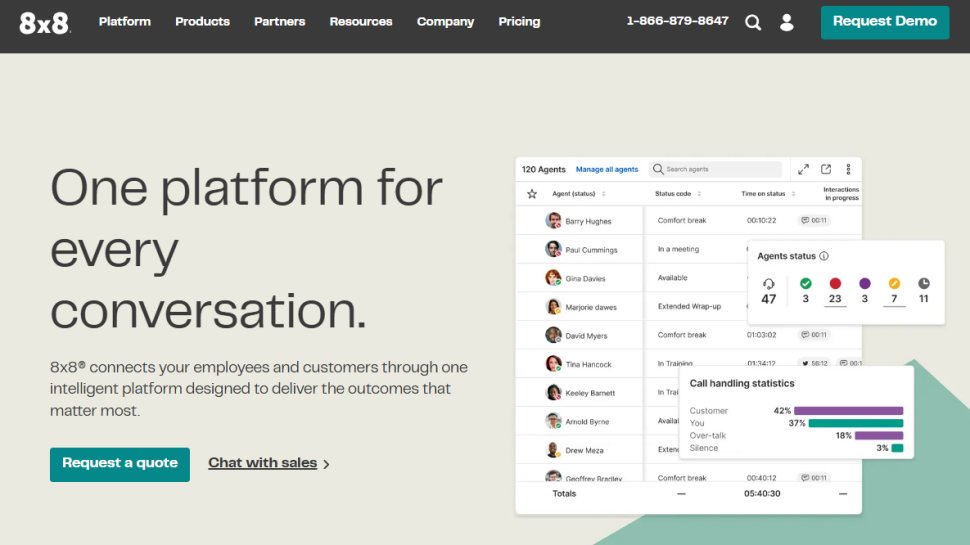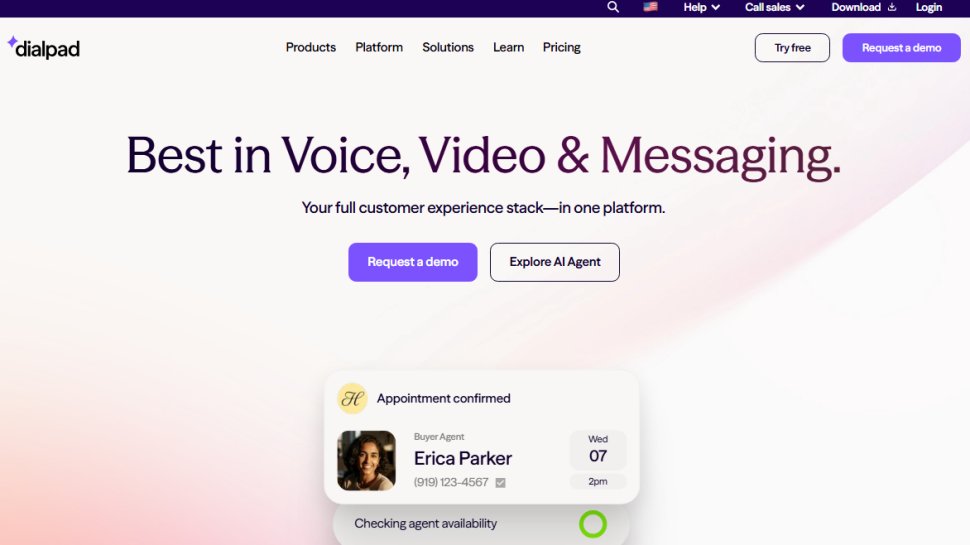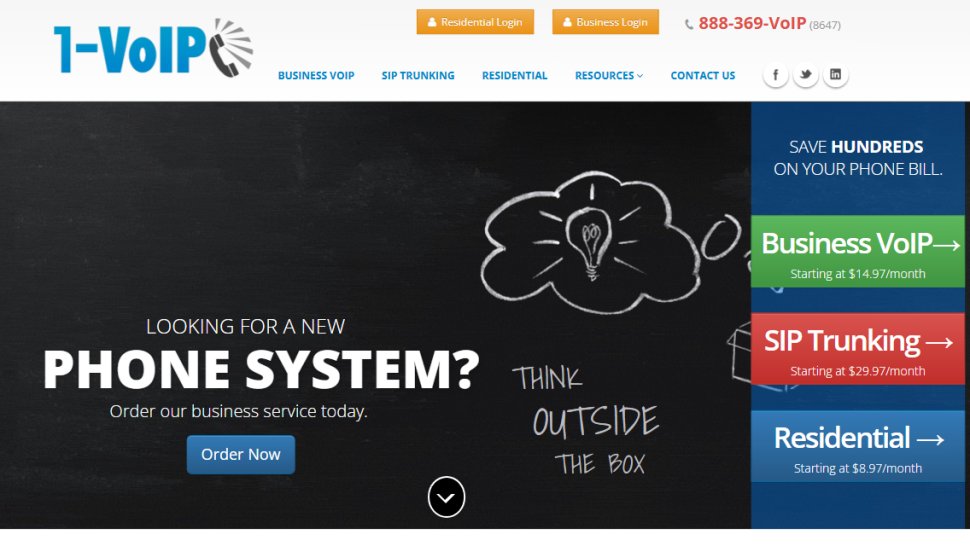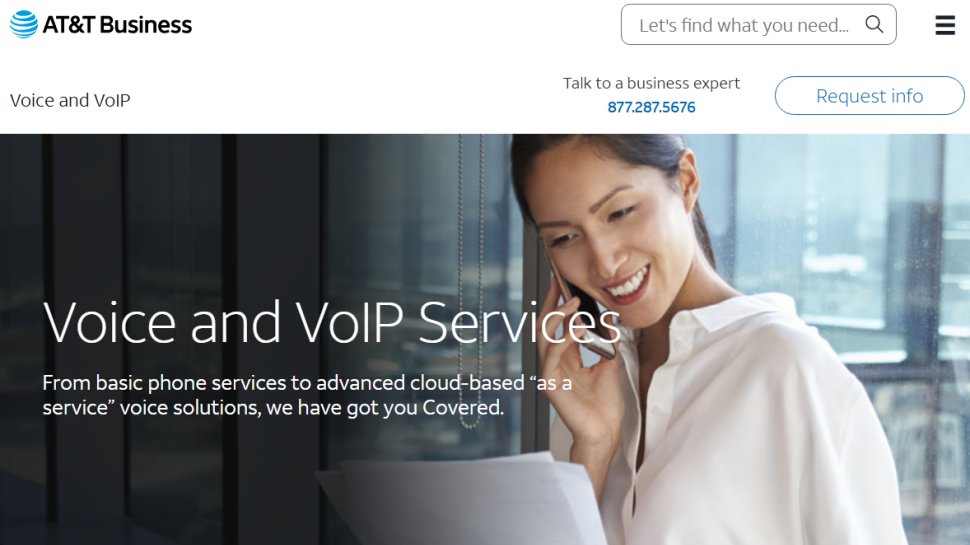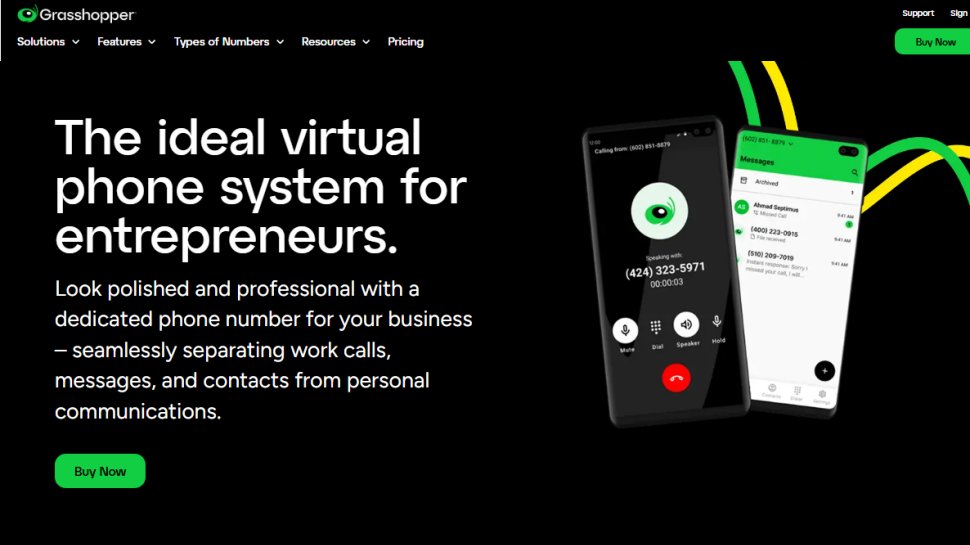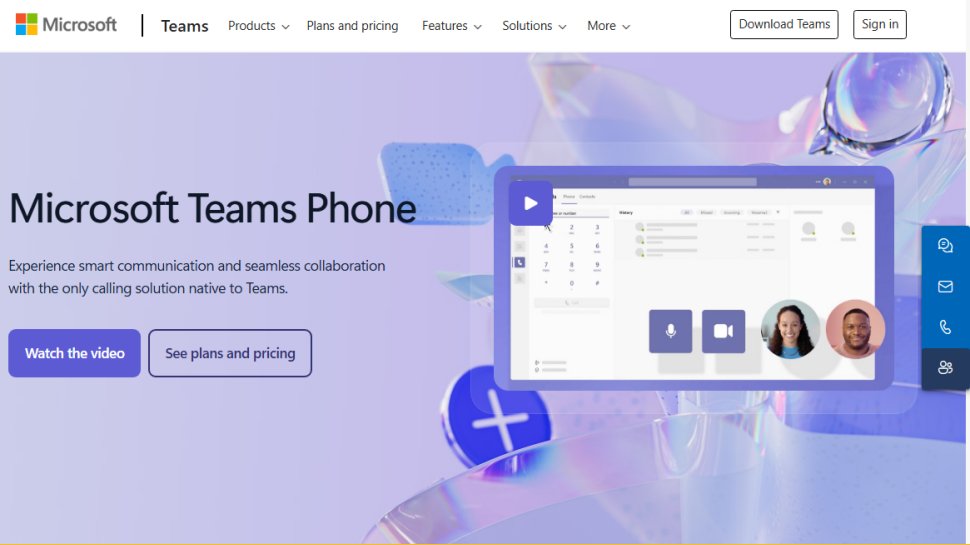Best VoIP provider of 2025
Phone systems for office and remote working

Sign up for breaking news, reviews, opinion, top tech deals, and more.
You are now subscribed
Your newsletter sign-up was successful
We list the best VoIP providers, to make it simple and easy for businesses to save on costs by managing your phone system through the internet.
VoIP (Voice over Internet Protocol) has become an integral feature for modern business communications, and is replacing the familiar landline. The reasons are simple: VoIP is easy to set up for office, remote working, and mobile device use; VoIP can deliver on productivity integrations and analytics; and even better is that VoIP has all features of an advanced PBX phone system but at a fraction of the cost.
There's a lot to consider when choosing a VoIP service provider, and the best for one business isn't necessarily best for another. Therefore, we've picked the best VoIP services based on ease of management, useful features, and practicality as a business phone system using VoIP.
We've made recommendations based on different use-cases and different business sizes and types. Knowing what you need from your VoIP service before you set out to look is key, so you may want to read our article: How to choose a small business VoIP phone service before you proceed, or keep reading for some general advice.
Below we'll list what we think are the best VoIP providers currently available.
We've also featured the best VoIP phone and best VoIP headset.
The best VoIP providers of 2025 in full:
Why you can trust TechRadar
Best VoIP provider overall
Reasons to buy
Reasons to avoid
RingCentral is a great all-rounder for businesses, regardless of industry. It's a cloud-based PBX platform that includes all the features that modern organizations have come to expect from their VoIP system: video software, collaboration tools, and even AI capabilities.
All the core features are included, such as an auto-attendant system, a company directory, call forwarding and handling, and multiple extensions. A 99.999% uptime SLA also means that businesses can have peace of mind that any disruptions to their communications network are going to be infrequent affairs.
There is also a range of pricing plans to choose from, starting with the Essentials plan for small to medium-sized businesses, and includes unlimited voice and video calling, a free local and toll-free number, and 1500 toll-free minutes but the limit of 20 users is unlikely to be enough for some firms.
Fortunately, RingCentral’s plans for larger businesses are where the solution really comes into its own. The Standard plan comes with no limits on user numbers, while the Premium offering also comes with automatic call recording, real-time analytics, and integrations with some of the best CRM software like Salesforce, Zendesk, and more.
For organizations that need the most advanced VoIP solutions, the Ultimate package, also comes with device status reports and unlimited storage. Whatever plan businesses plump for, the scalability of RingCentral MVP is one of its most important benefits. With APIs available in the backend, this is a VoIP solution that can be scaled and customized accordingly into a full-scale unified communications solution as well as a cloud contact center.
Read our full RingCentral MVP review.
Best VoIP provider for features
Reasons to buy
Reasons to avoid
With all of the VoIP solutions featured in this guide, there is a multitude of different features on offer, depending on the particular pricing plan that businesses decide to go for. What makes GoTo Connect so impressive is the sheer number of features available, with the platform offering businesses more than 100 calling, collaboration, and mobile features and tools, as well as several video conferencing services.
All of the general features, including custom call routing, team-based call distribution, as well as time-based and geolocation routing, are included, and customers also have access to personal meeting rooms.
Advertising itself as a UCaaS solution, businesses don’t need to install any new equipment and GoTo Connect will handle all maintenance and upgrades. That being said, the company does recommend that customers have a business-standard router, an Ethernet switch capable of Quality of Service, and a firewall configured to allow access to HTTP, HTTPS, and UDP traffic on their network.
Interestingly, unlike most VoIP service providers, GoTo Connect does not charge businesses more for additional features. Instead, the company’s pricing plan varies based on how many employees a business has. Prices range from $29.95 per user, per month for customers with between one and four users, to as little as $19.95 per user, per month for businesses with between 50 and 99 users. All pricing plans come with access to the majority of GoTo Connect’s tools, and bespoke pricing plans are available for businesses with more than 100 members of staff.
Among the available features are Cloud PBX, custom hold music, call management, advanced ring strategies, and one-click screen sharing. Of course, more features do mean a greater potential for things to go wrong, but GoTo Connect also offers extensive email and call support should any issues arise.
Read our full GoTo Connect review.
Best VoIP provider for unlimited calls
Reasons to buy
Reasons to avoid
If you’re considering cloud-based communication for your employees and customers, Nextiva certainly has many points in its favor, including flexible pricing plans and a range of features to match many of its rivals.
You can make unlimited calls to any phone in the US or Canada, and its real-time presence feature also allows you to see which of your contacts is currently available, while the call queue allows you to handle calls during busy times. Video conferencing is available with all plans, and Nextiva allows you to share screens and files during your conferences. You can also use Nextiva’s video function to livestream virtual events and webinars.
Other features include that voicemail messages can be delivered directly to your email inbox, and the software also gives you the ability to record your outgoing voicemail message. You can also send and receive an unlimited number of text messages, and you can send and receive unlimited faxes.
Nextiva's system has clearly been designed with usability and functionality in mind. By dividing its tools on the basis of communication, sales, and service, the company allows you to find the features you need as soon as you log in.
There are also various integrations available, such as for Outlook and Google Contacts, as well as for Salesforce, Hubspot, and Zendesk on the Professional plan.
One of the biggest selling points could lie in the option for a free trial. If you’re still undecided, it might be worth signing up for the trial to see if Nextiva is the right solution for your organization.
Read our full Nextiva VoIP services review.
Best affordable VoIP provider
Reasons to buy
Reasons to avoid
Perhaps the first thing to notice about the 8x8 eXperience Communications Platform is its price tag. For an enterprise-standard VoIP service, its base offering is very affordable, which is ideal for any organization that feels like it is currently spending too much on its communication tools.
The 8x8 Express Plan comes with unlimited video conferencing, chat, calling, and SMS messages across the US and Canada and a bespoke app to manage all your business communications. As a sweetener, the plan also comes with a one-month free trial, plus three months access to one of the best website builder platforms, Wix.
For businesses that need more features than those on offer with the Express plan, the X Series X2 plan provides unlimited calling within 14 countries, video and audio conferencing, SMS, MMS and Teams chat functionality, and various enterprise integrations, including Google Workspace, Microsoft 365, Outlook, NetSuite, Salesforce and ZenDesk.
The X Series X4 plan, meanwhile, adds unlimited calling within 47 countries, call quality reporting, and supervisor analytics. Additional plans are designed to cater for voice-focused contact centers and multichannel associates.
It is worth noting that the 8x8 eXperience Communications Platform does not offer a bargain basement service – and higher-level plans can come at a significant cost. Aside from the great affordability provided by 8x8's more basic plans, all the company's solutions also make great collaboration tools. A universal team messaging application allows businesses to collaborate internally as well as with clients and vendors and includes extensive interoperability with third–party solutions.
Read our full 8x8 review.
Best VoIP provider for remote workers
Reasons to buy
Reasons to avoid
Software has changed the nature of telephone communications in many offices and this is particularly evident when using Dialpad. The VoIP solution is cost-effective and well-designed and is particularly suited to businesses that have workflows favorable to using softphones – software applications that are installed on internet-connected devices in order to make phone calls.
The company’s VoIP offering, actually called Dialpad Talk, uses cloud calling and AI to boost employee productivity and flexibility. Members of staff can work from anywhere and use any device for their business conversations, and AI-powered voice intelligence can be used to automating note-taking and detect customer sentiments during a call.
User setup is straightforward as Dialpad comes with one central administrator portal that makes it easy to add new users, assign them phone numbers, connect them with office suites like Google Workspace and Microsoft 365, and establish their permissions. The whole process should only take a few minutes and either a desktop interface or smartphone app can be used to manage user profiles day-to-day.
While remote working has certainly become more common of late, Dialpad remains compatible with many desk-based phones, and the company has also partnered with Jabra and Poly to integrate functionality with a number of headsets.
Price-wise, Dialpad Talk is extremely competitive, and there is an option to include integration with the identity management platform Okta.
Read our full Dialpad review.
Best VoIP provider for spam filtering
Reasons to buy
Reasons to avoid
1-VoIP offers both residential and business VoIP solutions, with its business offering proving particularly useful for companies on a budget. Companies gain access to HD call quality and more than 40 features across 1-VoIP’s metered plan. With this plan, customers only pay for what they use, facing an additional charge of 2 cents per minute for any calls made.
All features are included with each business plan, with extension-to-extension calling, digital call forwarding, and cell phone redirection available at no extra cost. Other useful features include the use of an auto attendant to make sure callers are redirected to the correct department, and custom pre-recorded announcements that can be adapted for each particular recipient.
One of the most useful aspects of the 1-VoIP solution is its integration with the third-party anti-spam service Nomorobo. So far, this solution has been used by organizations to block more than 2 billion automated spam calls. The service is flexible, allowing companies to toggle the feature on and off, and businesses can report new spam numbers to the service for review. The service is also continuously monitored so calls from essential services like schools and pharmacies are always permitted.
A few frustrating aspects of the 1-VoIP service have been pointed out by users, particularly in terms of the setup and configuration. Finding the right settings for international calling can be challenging, for example, and there’s not much in the way of integration with CRM solutions. Nevertheless, 1-VoIP is a good choice for businesses that want a fairly standard VoIP solution that will prevent telemarketers from pestering their employees.
Read our full 1-VoIP review.
Best VoIP provider for small business
Reasons to buy
Reasons to avoid
Affordably priced and with a couple of different plans to choose from, Ooma Office is a great choice for smaller firms or businesses that have a sizable number of remote workers.
The basic plan comes with a mobile app, a virtual receptionist, call-forwarding functionality, and a host of other features. Ooma Office Pro adds video conferencing tools, voicemail transcription, and a number of other useful business features.
The offering is particularly useful for companies with remote workers, with both the mobile and desktop apps allowing workers to make and receive unlimited calls within the US using their business number.
Another particularly handy feature is Ring Groups, which allows organizations to group extensions together so they all ring simultaneously. The call is then simply transferred to whichever employee answers first.
Although the fact that video conferencing only comes with the more expensive pro plan may disappoint some businesses, Ooma Office still represents a great choice for firms that may not need the flashiest VoIP solution.
Read our full Ooma Office review.
Best VoIP provider for legacy hardware
Reasons to buy
Reasons to avoid
Telecoms giant AT&T may be one of the older players in the communication space but that hasn’t stopped it from adopting the most up-to-date developments in the VoIP market. In particular, what makes AT&T Business so unique is the way that it integrates with legacy systems. AT&T Collaborate supports prebuilt integration with approximately 30 external services, including Microsoft Outlook, Microsoft 365, and various Salesforce offerings, and existing analog office phones can continue to be used.
Although new registrations are no longer being taken for AT&T Collaborate, AT&T Office@Hand is a flexible cloud-based solution delivering voice, fax, and text messaging options, as well as audio and video conferencing features. The solution is cloud-based and comes with three pricing plans.
The Standard Edition includes unlimited internet faxing, 1000 toll-free minutes per month, and allows unlimited user numbers. The Premium Edition also comes with Salesforce integration and 200 HD video seats. Prices for the Enterprise Edition vary but all customers will receive 10,000 toll-free minutes a month.
While AT&T does allow businesses to use their own hardware for the Office@Hand service, providing it is compatible, the company will not be able to provide help desk support. Instructions will be provided on how to configure the equipment but that is unlikely to completely prevent difficulties from arising, so it’s a good idea for businesses to employ experts during the installation process.
Once installation and configuration are out of the way, however, AT&T Business is simplicity personified. Each employee is given their own unique extension and direct-dial number for voice, fax, and text messaging.
Read our full AT&T Business review.
Best lightweight VoIP provider
Reasons to buy
Reasons to avoid
Acquired by remote access solutions provider LogMeIn in 2018, Grasshopper delivers a great VoIP service for smaller firms, particularly those that may not have the financial resources to invest in additional hardware. With Grasshopper, businesses simply gain access to a PBX software instance that connects extensions to existing phone numbers. Businesses only need a functioning phone number, existing handsets (which includes cell phones), and a reliable internet connection.
But while the requirements for Grasshopper are slight, the number of features on offer are also somewhat limited. There is no analytics here, nor the kind of advanced features needed to support call centers or VoIP desktop phones. Customers do gain access to an unlimited number of business calls and texts, call forwarding options, and 24/7 support but beyond that, there’s not much to say about the Grasshopper solution.
Fortunately, the pricing is very favorable, with a Solo-tier for one number and three extensions. The Partner tier, on the other hand, offers three numbers and six extensions, whole the Small Business tier comes with up to five numbers and an unlimited number of extensions. Unlike most VoIP providers, Grasshopper’s prices aren’t charged on a per-user basis. These are all-in monthly costs, which means small businesses could face a significantly smaller bill.
Aside from the price, the ease of setup is another bonus of the Grasshopper solution, with users simply selecting their service level and choosing their numbers before the service is ready to go. There’s also a desktop, iOS, and Android app for easy management of Grasshopper’s features.
Read our full Grasshopper review.
Best VoIP provider for Microsoft Teams
Reasons to buy
Reasons to avoid
Microsoft’s many digital solutions are already commonplace in offices all over the world and the company now has a cloud telephony service to add to its portfolio. Microsoft Teams Phone lets organizations make calls from any device to anywhere in the world, leveraging the company’s cloud services to ensure high levels of reliability and good audio quality.
In terms of pricing, Microsoft Teams Phone works out to be very affordable - particularly if subscribers are already paying for Microsoft 365. It includes a cloud-based phone system with advanced features such as call transfer, multi-level auto attendants, and call queues, as well as 24/7 customer support.
Perhaps the most attractive feature of Microsoft Teams Phone is the way that it integrates seamlessly with Microsoft Teams. Since the onset of the COVID-19 pandemic, Teams has become increasingly important to businesses and many will no doubt appreciate the ease with which Microsoft Teams Phone connects to the platform. Setup is quick and it is easy to view upcoming Teams meetings and connect to discussions via your VoIP handset.
The major drawback for users of Microsoft Teams Phone is that it comes with a user limit of 300, which makes the service suitable for small to medium-sized businesses (SMB) only. Nevertheless, if that’s not an issue, then Microsoft Teams Phone represents a great option, particularly for firms that already rely on a number of other Microsoft solutions.
Read our full Microsoft Teams Phone review.
Best VoIP provider FAQs
Looking for a VoIP phone or VoIP service provider and not sure where to start? Read these first:
☎ How to choose a small business VoIP phone service
📞 VoIP vs PBX: How to choose which business phone system is right for you
✔ Get a quote for a business phone system today
❗ Easy mistakes your business could make when choosing a VoIP system
Do you need VoIP provider services or VoIP hardware?
It can be easy to mix up the two when you've just started your search, but answering this question early on will help you find the best VoIP provider for your business faster.
While VoIP hardware refers to the phone handsets themselves, VoIP service providers actually deal with the establishment and routing of calls over a high-speed internet connection.
Many VoIP service providers also provide additional telephony features. Often, these features can transform a standalone business VoIP solution into a unified communications (UC) platform, with functions specifically designed for business communication.
Top VoIP service providers for business
Some of the best known VoIP service providers include Aircall, Avaya, Vonage, and RingCentral, in addition to well-known tech firms like Microsoft and Google.
These companies may list their solutions as VoIP services, VoIP business phone systems, or cloud phone systems. Ultimately, these terms all mean using a broadband internet connection to make a voice call instead of a regular (or analog) phone line.
Continues below...
What is VoIP and how does it work?
Let's start with the basics. VoIP, or Voice over Internet Protocol, is a technology that enables voice communications to be transmitted via an internet connection rather than through a traditional phone network.
VoIP works in much the same way as a conventional phone system, but it’s usually much more affordable and easier to scale.
VoIP technology also comes with a suite of benefits that traditional phone systems don’t. For example, it enables you to make or receive calls from virtually any device, in any location, as long as you have an internet connection. Use your smartphone, tablet, computer, or even dedicated VoIP hardware to stay in touch at all times.
Many VoIP systems also come with several advanced features, such as simple call routing, advanced on-hold messages, and multiple phone numbers.
At the higher end of the spectrum, many VoIP packages are equipped with integrated tools, such as online fax, integrated email marketing, and video conferencing.
The benefits of VoIP
These are some of the most common features offered by VoIP providers. They usually come as standard, although some will only be included in more expensive packages.

Video and audio conferencing
Many VoIP handsets come with screens and cameras built-in, so it’s possible to video conference right from a desk, without having to use a laptop. Audio conferencing can be a much more convenient option, especially when not every call participant has access to a camera-enabled phone.

Voicemail
Whether you work with a traditional phone system or VoIP, voicemail has become an essential part of our working lives. The great thing about VoIP voicemail is that you can access it anywhere and from any supported device, such as a cell phone or laptop. You need never miss an important call again.

Screen sharing
Screen sharing is perfect for viewing (and controlling) a colleague’s computer for collaboration purposes and for helping a customer with a technical or sales issue. Integration is simple and the sharer doesn’t even need to download any additional software.

Home/mobile working
Because VoIP works with the internet, your VoIP phone account can be accessed on any supported device: typically using an app on your phone, laptop, or tablet. This means you can make and receive calls to and from your VoIP number whether you’re working from home or visiting a client.

CRM integration
CRM has become a vital tool for businesses for tracking interactions with customers and clients. VoIP CRM integration can help you manage customer relationships more efficiently through real-time call tracking, analyze customer behavior for marketing purposes, and provide a better customer experience.

Call monitoring
With VoIP, voice (and fax) communications can be stored as digital data packets - this makes monitoring calls straightforward and efficient. Call monitoring keeps business standards high, enabling managers to monitor performance and compliance, reduce liability, and apply training accordingly.

Advanced call routing
VoIP’s advanced call routing can direct inbound calls to any person or team in real-time. This means that you can easily communicate business hours, manage long wait times by offering an option to leave a voice message, and easily scale your call center as your team grows.

Call recording
With VoIP you can record any call, making note-taking a thing of the past. Incoming and outgoing calls are stored on the cloud, meaning they can be accessed from anywhere. You don’t even need to record from the beginning to get the entire call - you can choose to keep a recording of the call at any point in the call.

On-hold music and messaging
No one likes to be kept on hold in silence, so using the right on-hold music can help reassure people in line, and is an opportunity for you to promote offers and advise on services. On-hold music is usually offered by a VoIP provider, but you can also use third-party plug-ins to expand your musical options.
How much does VoIP cost?
The cost of a VoIP system can vary immensely. Numerous basic free solutions are available, and premium plans can range from a few dollars per year into the hundreds or even thousands per month for businesses with high-end requirements.
Most VoIP service providers offer unlimited voice and video calling, along with unlimited SMS to numbers in specified parts of the world. Subscriptions are usually offered on a per-user basis, which means that you can expect to pay more if you need support for more team members.
Some providers do offer all-in-one solutions that support a specified number of users for one price, but this payment model isn’t all that common.
Expect to pay extra for advanced features, integrations with certain third-party platforms, and international calling options.
The five best VoIP phone services compared
VoIP service | Pricing | Features | Support |
|---|---|---|---|
From $19.99 / £7.99 per user/mo | Integrated phone, video conferencing, and messages; RingCentral app | Live chat, support case, app integration, knowledge base | |
From $19.99 /user/mo | Mobile app, ring groups, video conferencing (Pro plan-only) | Live chat, knowledge base, 24/7 phone | |
From $18.95 per user/mo | HD phone, app, team chat, conversational AI | Live chat, knowledge base, ticketing | |
From $14 / £12 per user/mo | Call and routing, video conferencing (+ mobile app), voice intelligence | Live chat, knowledge base | |
From $15 per user/mo | Cloud phone, chat, video conferencing | Live chat, knowledge base |
Looking for more information about VoIP? Our FAQ will help you understand the benefits of VoIP solutions for businesses of all sizes.
What equipment do I need for VoIP?
The only equipment you need for a VoIP system is a strong internet connection and a device that can connect to the internet.
Most service providers offer some sort of mobile and/or desktop app which you can download and use to manage incoming and outgoing calls and messages. On top of this, many VoIP platforms feature a powerful web interface, enabling users to log in from any device with an internet connection.
However, many businesses opt to add extra VoIP hardware. Specialized phone systems, headsets, and even things like PC handsets are available to streamline business workflows and maximize the efficiency of your VoIP.
Speak with your VoIP service provider to find out more about the available hardware options.
Is VoIP free?
There are numerous free VoIP solutions available, but most of these are targeted at personal users rather than businesses, and they tend to come with quite limited features. Popular examples of free VoIP services include messaging apps such as WhatsApp, Skype, Viber, and more.
Many people go with free VoIP apps because they are simple, easy to download and set up, and in general, more than adequate for basic personal use. However, they tend to be a little limited when it comes to advanced features for business, which is why we often recommend a premium solution.
One major drawback with free VoIP apps is that everyone has to be using the same application. You can’t use WhatsApp to call Skype or vice versa, for example. And in most cases, a paid solution is required if you want to call phone numbers directly.
In terms of advanced business features, most free solutions lack even basic tools such as call recording, simple data collection, and on-hold messages, which will likely be a major concern for many corporate users.
So, while free VoIP options are available, business users will generally be much better serviced by a premium solution.
How does a VoIP phone number work?
For all practical purposes, a VoIP phone number is identical to a traditional landline or cell phone number. It enables you to call any landline or mobile number, send SMS messages, and access other advanced features.
The main difference between a VoIP number and a traditional phone number is that a VoIP number isn’t linked to a specific phone line or SIM card. Rather, it’s linked to a user and can be accessed from virtually any device with an internet connection.
What are the disadvantages of VoIP?
Despite its rapid growth as a business phone technology, VoIP has its disadvantages over traditional phone systems. With a good VoIP setup, these will generally be minor, but it’s still important to be aware of them.
For one, all VoIP systems require a strong internet connection. If your connection is slow or unstable, your phone system will likely suffer. You may have trouble making or receiving calls, which can impact general business processes.
Additionally, you need to ensure your connection has low latency. This basically means that there shouldn’t be major delays in either transmitting or receiving VoIP data, or else your system will be hindered.
Another minor consideration is that your VoIP devices will need to have a reliable power source. Many traditional phones don’t require consistent mains power, and most others consume very small amounts of energy. However, VoIP devices can’t be used if there’s a power outage, which means that you may need to consider installing some form of backup supply.
Finally, not all VoIP systems are secure. Ensure you’re using a reliable service provider to reduce the risk of hacking, viruses, and serious data loss.
What are the advantages of VoIP?
Although it has its disadvantages, the advantages of using a VoIP system usually outweigh these.
The cost savings associated with setting up and using a new VoIP system, compared to a traditional business phone network, are probably top of the list. Infrastructure costs are significantly lower, as are recurring service costs.
Another clear advantage is the flexibility that VoIP offers. Let’s say, for example, that you’ve had to leave the office early for some reason. If you have your VoIP app installed on your smartphone, you can continue to make and receive important calls as long as you have an internet connection.
Similarly, you will be able to log in to your VoIP interface from your personal computer if required. Team members can also work remotely without relying on hardwired phone systems, which significantly improves business flexibility.
Furthermore, VoIP systems are highly scalable, which makes them a great option for fast-growing companies. It’s extremely easy to add new users without having to purchase expensive hardware, which is a feature that many businesses will find attractive.
Finally, most VoIP systems come with significantly more advanced features than traditional phone systems. Things like call forwarding and automated attendants are extremely easy to set up. You’ll also often have access to advanced video conferencing and messaging tools, and you’ll be able to select local phone numbers for virtually anywhere in the world.
How do you call a VoIP number?
To call a VoIP number, follow the same steps as you would to call a landline or mobile number. VoIP phone systems function in practically the same way as traditional systems, enabling users to send and receive calls and SMS messages.
One thing to note here is the country and area codes of VoIP numbers. Firstly, just because an individual or company has a number with a certain area code doesn’t mean that they live or operate there. In fact, many businesses have local numbers across the world to make it easier for clients to contact them.
On top of this, you’ll need to be mindful if you’re calling a VoIP number from a landline or cell phone. Otherwise, you may end up placing an international call which could become very costly.
Can I text a VoIP number?
Yes, you can text a VoIP number.
Texting them is exactly the same as texting a normal cell phone. The VoIP user will receive your texts via their user interface, on a smartphone, tablet, PC, or specialized hardware.
VoIP technical terms explained
Bandwidth
In a VoIP context, your system’s bandwidth refers to the amount of data that can be transferred at any given time. It’s usually measured in bits per second and provides important insights into the capability of your network. Larger networks with more users will naturally require a higher bandwidth.
Codec
Codec is a technical term that refers to the software used to compress and decompress VoIP data. Different systems use different VoIP codecs, and these play a large role in determining your system’s bandwidth and audio quality.
DSL
DSL, or Digital Subscriber Line, refers to one of the most popular types of VoIP installation. It uses existing copper telephone lines to establish a broadband internet connection, transmitting audio and video data through a DSL router or modem.
IP
Internet Protocol (IP) telephony refers to the various technologies that form the basis of modern VoIP solutions. These are used to transmit voice, fax, and other data from a VoIP device to the traditional phone network and vice versa.
IVR
IVR, or Interactive Voice Response, refers to software that delivers automatic audio information to callers. With this, you can set up keypad-controlled menus, enabling callers to connect with the most appropriate team members with a minimum amount of fuss.
Latency
The term latency is often used interchangeably with lag. In layman’s terms, it refers to the time it takes for data to transmit. Slow internet connections generally have high latency, which decreases as your connection gets faster.
PBX
A PBX, or Private Branch Exchange, is designed to manage a company or organization’s internal phone systems. In a VoIP context, you will often see the acronym IP PBX, which essentially manages extensions, fax systems, and every other aspect of your phone system.
RTP
Real-Time Transfer Protocol (RTP) is designed to enable the streamlined transmission of audio and video data. Its main purpose is to ensure all data has a temporal reference, making sure audio and video transmissions are fully synchronized at all times.
SIP Trunking
Session Initiation Protocol (SIP) trunking is used to transfer voice and other data over an internet connection. In simple terms, it enables VoIP users to connect with traditional phone users, providing a bridge between the two different systems.
Softphone
The term softphone is used to describe any app or other program that enables you to use a mobile device or computer as a phone system. Usually, softphone interfaces come with everything you need to manage incoming and outgoing calls and messages.
VoIP
VoIP, or Voice over Internet Protocol, is the base technology underlying internet phone systems. With it, users can make and receive calls from virtually any device with an internet connection. VoIP systems are generally much more affordable than traditional phone systems, which makes them attractive to businesses across the world.
Which type of VoIP service is best for you?
When deciding which of the best VoIP providers to use, first consider what actual needs you have. For example, someone simply wanting to talk to a handful of people on a casual basis may find a budget option is the most cost-effective while providing all of the necessary tools that would be required. However, if you're planning to use a VoIP provider for professional or business purposes, especially with a large number of people and on a regular basis, then you will probably want to look to the higher-end options for the more advanced tools that are included.
How we tested the best VoIP providers
To test for the best VoIP providers we first set up an account with the relevant software platform, whether as a download or as an online service. We then tested the service with VoIP and video calling, as well as the range of administration tools available. The aim was to see how user-friendly its features were, and also how easy it was to get to grips with any advanced options.
Read how we test, rate, and review products on TechRadar.
Learn more about the VoIP systems and phones
Looking for more information on VoIP services? Try these articles: How to choose a small business VoIP phone service gives advice for first-time buyers; Best VoIP phones reviews IP handsets for the small business and home office and you can always check our our latest VoIP phone reviews to find the best handset or headset for your team.
Get in touch
- Want to find out about commercial or marketing opportunities? Click here
- Out of date info, errors, complaints or broken links? Give us a nudge
- Got a suggestion for a product or service provider? Message us directly
- You've reached the end of the page. Jump back up to the top ^
Sign up to the TechRadar Pro newsletter to get all the top news, opinion, features and guidance your business needs to succeed!
Daniel is a freelance copywriter with over six years experience writing for publications such as TechRadar, Tom’s Guide, and Hosting Review. He specializes in B2B and B2C tech and finance, with a particular focus on VoIP, website building, web hosting, and other related fields.
